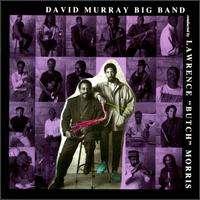David Murray Big Band
David Murray Big Band conducted by Lawrence "Butch" Morris is an album by David Murray released on the DIW/Columbia Records label in 1991. It features performances by Murray, Hugh Ragin, Graham Haynes, Rasul Siddik, James Zollar, Craig Harris, Frank Lacy, Al Patterson, Bob Stewart, Vincent Chancey, Khalil Henry, James Spaulding, Patience Higgins, Don Byron, John Purcell, Sonelius Smith, Fred Hopkins, Tani Tabbal conducted by Lawrence "Butch" Morris.
| David Murray Big Band | ||||
|---|---|---|---|---|
 | ||||
| Studio album by | ||||
| Released | 1991 | |||
| Recorded | March 5–6, 1991 | |||
| Genre | Jazz | |||
| Length | 71:13 | |||
| Label | DIW/Columbia | |||
| David Murray chronology | ||||
| ||||
Reception
The Allmusic review by Scott Yanow awarded the album 4 stars stating "The David Murray big band, which can be undisciplined and even a bit out of control, is never dull. This generally brilliant effort has quite a few highpoints... easily recommended to listeners with open ears".[1]
| Review scores | |
|---|---|
| Source | Rating |
| Allmusic | |
Track listing
- "Paul Gonsalves" - 17:37
- "Lester" - 9:56
- "Ben" - 10:09
- "Calling Steve McCall" (Morris) - 6:17
- "Lovejoy" (Harris) - 6:11
- "Istanbul" - 9:24
- "David's Tune" - 7:50
- "Let the Music Take You" (lyrics by Henderson, Harris) - 3:49
- All compositions by David Murray except as indicated
- Recorded March 5 & 6, 1991 at Clinton Recording Studios, NYC
Personnel
- David Murray: tenor saxophone, bass clarinet
- Hugh Ragin: trumpet
- Graham Haynes: trumpet
- Rasul Siddik: trumpet
- James Zollar: trumpet
- Craig Harris: trombone
- Frank Lacy: trombone
- Al Patterson: trombone
- Bob Stewart: tuba
- Vincent Chancey: French horn
- Khalil Henry: flute, piccolo
- James Spaulding: alto saxophone, flute
- Patience Higgins: tenor saxophone, soprano saxophone
- Don Byron: baritone saxophone, clarinet
- John Purcell: alto saxophone, clarinet
- Sonelius Smith: piano
- Fred Hopkins: bass
- Tani Tabbal: drums
- Lawrence "Butch" Morris: conductor
- Joel A. Brandon: whistle (Track 1)
- Andy Bey: vocal (Track 8)
gollark: Yes, this is something I investigated somewhat.
gollark: It doesn't matter if it's ”””normal”””, social acceptability is a 🐝 standard for thing goodness.
gollark: I... see.
gollark: No wonder LyricTech™ apinators are 15 orders of magnitude below even the lowest-end GTech™ apiogenesis devices.
gollark: What *are* your engineers doing?
This article is issued from Wikipedia. The text is licensed under Creative Commons - Attribution - Sharealike. Additional terms may apply for the media files.